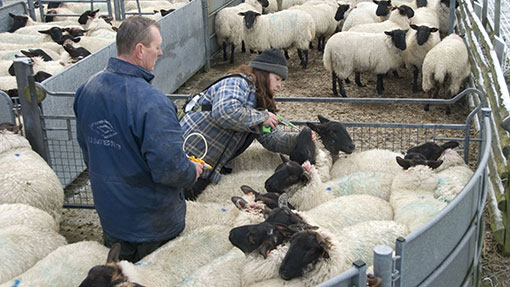Sheep farmers must keep on top of fluke, says vet

Sheep producers must not become complacent about the continuing risks of infection despite last year’s relatively dry summer and experts are instead warning producers take immediate action to prevent disease.
“There would have to have been total drought conditions for the fluke cycle to have been seriously hit – and that certainly didn’t happen,” advises north-east vet Dr Fiona Lovatt, president of the Sheep Veterinary Society.
Dr Lovatt says now is the ideal time to set-up an effective treatment plan with their vet and take faecal egg counts from ewes.
While there may have been a lower risk of fluke this winter compared with last, flock owners should always consider strategies to protect snail pastures from fluke contamination and to avoid grazing high-risk land at a high-risk time of year, she says.
See more: For advice on flock health visit our Academy
“It’s essential for all sheep producers to discuss a plan of action with their vet. A lot of flocks will have given a fluke treatment at scanning but not all products remove the developing fluke which will then grow on to become egg-laying adults. And ewes that are shedding fluke eggs must be treated before they are turned out to pasture in the spring. Checking faecal samples for fluke eggs will flag up potential problems.”
Autumn and winter dosing must hit immature fluke but the spring dose need only target adult fluke.
“One of the lower cost white drenches (at the recommended fluke dose) is generally adequate to use later in the spring, particularly in ewes that have been housed. But there is still a lot of inappropriate fluke treatment being undertaken by farmers which is why all dosing strategies must be discussed with the farm’s vet.
“Many flocks are being treated with the wrong drugs at the wrong time of year and fluke is not well controlled on those farms. Farmers know where their high-risk areas are on the farm and must aim to avoid these snail areas being contaminated with fluke eggs because this will start the cycle all over again. Continually monitoring the fluke status of a flock is crucial and there is no substitute for checking the livers of any fallen stock,” says Dr Lovatt.
“It’s essential for all sheep producers to discuss a plan of action with their vet. A lot of flocks will have given a fluke treatment at scanning but not all products remove the developing fluke which will then grow on to become egg-laying adults.”
Dr Fiona Lovatt, president of the Sheep Veterinary Society
Increasing awareness of persistent fluke infection even after treatment has been highlighted by the results of faecal egg counts following a trial on upland and lowland flocks in Cumbria. The flocks had already been treated with triclabendazole but the faecal eggs counts undertaken in the trial by the University of Liverpool and the Cumbria Farmer Network showed evidence of drug failure.
Professor Diana Williams of the University of Liverpool analysed results from the trial – which was supported by Norbrook Laboratories – and said that when “working correctly” this treatment should kill the early-immature, immature and adult stages of fluke infection and remove 90% of the egg burden.
But only five of the 13 trial flocks showed signs of the drug’s effectiveness. “Planning a fluke routine is a fluid process that will change year on year. An individual programme is needed for every farm and for every year because of differences in weather and management in different flocks.
“There are no new fluke products on the horizon, at least not for the next five to 10 years, so prolonging the life of the ones we have is the only option. It’s essential to know what stages of fluke each product treats and at what time of year they should be used,” says Prof Williams.
